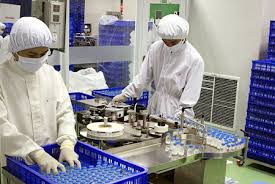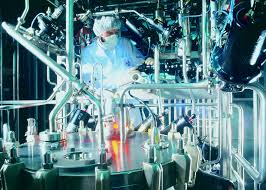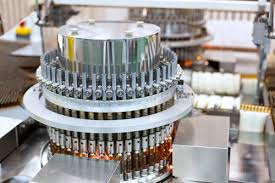Nigeria now emerging hub for pharma market expansion in Africa
As
growth opportunities continue to move away from traditional
pharmaceutical markets and growth patterns in developed markets continue
to flatten, many multinational companies (MNCs) like Norvatis, Pfizer,
Sanofi, Johnson & Johnson, etc. look toward Africa, including
Nigeria for their expanding global footprint.




This is
evident following GlaxoSmithKline (GSK) plan to invest over $200million
in Africa over the next five years, expanding manufacturing in Nigeria
and Kenya and building five new factories-Rwanda, Ghana and Ethiopia
given its attractive long-term growth potential.
With a
growing middle class of expected annual disposable income in excess of
$1 trillion by 2023, increasing awareness of healthier lifestyles, and a
combined Gross Domestic Product (GDP) of $2.9 trillion, rising
population growth is emerging as a melting pot for pharmaceutical
expansion.
Interestingly,
of the four MINT countries (Mexico, Indonesia, Nigeria, and Turkey),
Nigeria’s population is projected to outstrip other MINT countries by
2050 with population set to hit 402 million people.
Of the four
countries, Nigeria and Indonesia have the most consistent Gross Domestic
Product (GDP) at around 6 to 8 percent. The two countries-Nigeria and
Indonesia- have the lowest GDPs of the four MINT countries, at $1,555
and $3,557 per capita respectively, compared with $9,749 in Mexico,
$10,666 in Turkey, and $51,749 in the United States of America,
according to 2012 figures from the World Bank.
While most
medicines produced locally consumed domestically, Nigeria is responsible
for about 60 percent of medicines consumed in Economic Community of
West African States (ECOWAS) by volume, underlining huge sub-regional
market, according to Pharmaceutical Manufacturing Group, Manufacturers’
Association of Nigeria (PMG-MAN).
Though
estimates of Nigeria’s pharmaceutical market vary significantly,
Business Monitor International (BMI) in 2009 put the size of the
industry at $600 million. Furthermore, the African pharmaceutical market
is anticipated to achieve a year-on-year growth rate of 10.6 percent by
2020, resulting in pharmaceutical sales of $45 billion in 2020.
A report
titled “Pharma Emerging Markets 2.0: How emerging markets are driving
the transformation of the Pharmaceutical Industry,” revealed that over
the past five years, sales generated in emerging markets (Africa,
including Nigeria) have doubled, totalling $191 billion in 2011
(representing approximately 20 percent of global market volume)
The report
noted that pharmaceutical firms’ top initiatives to drive growth in
emerging markets over the next five years include investing in local
research, development and manufacturing, building local sales forces as
well as close collaboration with governments.
According to
the report “Many consider Africa to be the final frontier of emerging
markets. The continent is vast, highly diverse, and full of great
potential—but it also presents great challenges. Although sub-Saharan
markets are currently embryonic, their expected relative increase in
importance is significant and not far behind that of Southeast Asia.
“Top
executives are already factoring this development into their business
plans. While anti-infectives and anti-virals demonstrate strong
short-term growth, they will be overtaken by treatments for lifestyle
diseases in the long term. The market for oncological products is not
expected to grow as fast in Africa as in other regions during the next
five years. Partnerships that involve localized brands are very
important in Africa.”
Despite
Nigeria’s dominance within the ECOWAS sub-region in drug manufacturing,
Nigeria’s quest to become self sufficient in drug production is bleak as
it loses over N1.5 billion annually to the importation of Active
Pharmaceutical Ingredients (APIs), raw materials used in finished
pharmaceutical products which have direct effect in the diagnosis,
treatment or prevention of diseases from India, United States of
America, Germany, etc, experts have said.
While
pharmaceutical companies in Nigeria do not locally manufacture APIs such
as Paracetamol powder, Ampicillin dry powder etc, the non-availability
of APIs would significantly cripple the nation’s pharmaceutical sector.
Pharm Olatunji Koolchap, National Secretary,
Association of Community Pharmacists of Nigeria (ACPN), said that
Nigeria imports over 85 percent of its needs of APIs as it does not have
adequate capacity to produce APIs, with no commitment by the Government
to encourage investors in this vital sector of the economy.
While
stating that facilities required for APIs are high technology equipments
and machineries which can only be imported in to the country, Pharm. Koolchap
noted that continuous dependence on API importation will not make
Nigeria become self sufficient in production of medicines as this would
lead to rise in the price of medicines produced in the country.
“Nigeria can
correct this trend of not being able to provide raw materials APIs by
encouraging investors to invest in this sector locally in order to
compete with the international producers of the APIs such as USA, United
Kingdom, Germany, Canada, India, China etc. by reducing taxes on
manufacturing sector,” Pharm. Koolchap said.
Pharm. Ola
Ijimakin, General Manager, Marketing, Fidson Healthcare Plc, explained
that the reason why Nigeria cannot manufacture APIs is because the
petrochemical and chemical industries in the country are not developed.
While noting
that Petrochemicals are mostly the starting point for pharmaceutical
raw materials, Pharm. Ijimakin said that until the petrochemical industries in
Nigeria are developed, the nation may not be able to develop capacity
for APIs.
“As it
stands today if one decides to invest in API production, the finished
products will be very expensive and will not be able to compete with
imports because the necessary supporting industry and infrastructure is
not in place. A good chemical/petrochemical manufacturing facility is
needed to develop APIs. They are not extremely high tech but the
processing is fairly sensitive and risk of accidents with significant
environmental impact is high if not properly handled,” Pharm. Ijimakin
explained.
Pharm. Ijimakin
alleged fear that if something happens today and Nigeria pharmaceutical
firms are not able to source APIs, all pharmaceutical production of
drugs would stop.
“Cost of
finished pharmaceutical products is not in our hands. It is determined
to a large extent by the cost of imported APIs. There is the need to
develop the chemical/petrochemical industry, provide necessary
infrastructure and environment to make locally manufactured APIs
competitive in the international market as any local investor might need
to export if the local market is not able to absorb the products,”
Pharm. Ijimakin added.
Investigations reveal Nigeria and India signed a Memorandum of
Understanding on cooperation in Pharmaceutical Sector in March 2011,
with India exports pharmaceutical products, including APIs and fine
chemicals to Nigeria standing at $307 million as at March 31, 2012.
Explaining
India’s contribution to Nigeria pharma sector, Mr. Mahsesh Sachdev, Indian
High Commissioner to Nigeria said Indian medicines have traditionally
been the largest source of medicines into Nigeria, supplying over a
third of the market.
While the
surge is not surprising given the trust and faith that Nigerian
consumers repose in quality and efficacy of Indian medicines, Mr. Sachdev
revealed that Indian exports of pharmaceutical products have gone up by
35 percent and 37 percent annually in the last two years.
According to
Mr. Sachdev, “There are more than 30 Indian pharmaceutical companies
located in Lagos alone and engaged in manufacturing and/or importing
medicines, API and fine chemicals to Nigeria is worth $307 million in
year ending March 31 2012. With the industry growing at 13 percent
annually, the turnover is expected to grow five-fold by 2020. While
Indian Pharmaceutical industry is famous for generics, it is also making
fast inroads into branded products especially in biotechnology”
Industry
experts believe that addressing challenges such as dearth of
Intellectual Patent (IP) protection, price pressure, talent issues
(e.g., recruitment, development, and retention), compliance challenges,
supply chain and distribution issues, as well as lack of reimbursement
and public funding will reposition the nation within the global
pharmaceutical space.
With few
pharmaceutical companies currently prepared to commit themselves to
significant investments in local infrastructure, pragmatic partnering
approach involving local NGOs, governments, and distributors will
further enhance the sector towards achieving its lofty dreams.

Comments
Post a Comment